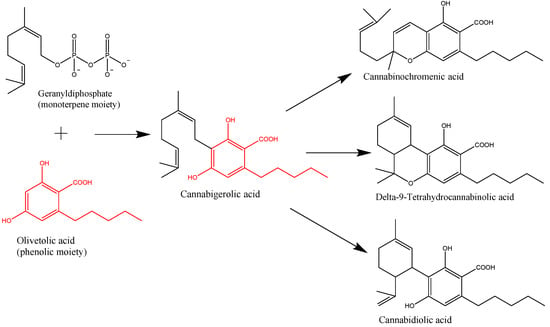 “Cannabis sativa L. is a plant long used for its textile fibers, seed oil, and oleoresin with medicinal and psychoactive properties. It is the main source of phytocannabinoids, with over 100 compounds detected so far. In recent years, a lot of attention has been given to the main phytochemicals present in Cannabis sativa L., namely, cannabidiol (CBD) and Δ9-tetrahydrocannabinol (THC). Compared to THC, CBD has non-psychoactive effects, an advantage for clinical applications of anti-tumor benefits. The review is designed to provide an update regarding the multi-target effects of CBD in different types of cancer. The main focus is on the latest in vitro and in vivo studies that present data regarding the anti-proliferative, pro-apoptotic, cytotoxic, anti-invasive, anti-antiangiogenic, anti-inflammatory, and immunomodulatory properties of CBD together with their mechanisms of action. The latest clinical evidence of the anticancer effects of CBD is also outlined. Moreover, the main aspects of the pharmacological and toxicological profiles are given.”
“Cannabis sativa L. is a plant long used for its textile fibers, seed oil, and oleoresin with medicinal and psychoactive properties. It is the main source of phytocannabinoids, with over 100 compounds detected so far. In recent years, a lot of attention has been given to the main phytochemicals present in Cannabis sativa L., namely, cannabidiol (CBD) and Δ9-tetrahydrocannabinol (THC). Compared to THC, CBD has non-psychoactive effects, an advantage for clinical applications of anti-tumor benefits. The review is designed to provide an update regarding the multi-target effects of CBD in different types of cancer. The main focus is on the latest in vitro and in vivo studies that present data regarding the anti-proliferative, pro-apoptotic, cytotoxic, anti-invasive, anti-antiangiogenic, anti-inflammatory, and immunomodulatory properties of CBD together with their mechanisms of action. The latest clinical evidence of the anticancer effects of CBD is also outlined. Moreover, the main aspects of the pharmacological and toxicological profiles are given.”
Tag Archives: pro-apoptotic
The antitumor action of cannabinoids on glioma tumorigenesis.
“Cannabinoids are a class of chemical compounds with a wide spectrum of pharmacological effects, mediated by two specific plasma membrane receptors (CB1 and CB2).
Recently, CB1 and CB2 expression levels have been detected in human tumors, including those of brain.
Cannabinoids-endocannabinoids exert anti-inflammatory, anti-proliferative, anti-invasive, anti-metastatic and pro-apoptotic effects in different cancer types, both in vitro and in vivo in animal models, after local or systemic administration.
We present the available experimental and clinical data, to date, regarding the antitumor action of cannabinoids on the tumorigenesis of gliomas.”
The CB2 cannabinoid receptor signals apoptosis via ceramide-dependent activation of the mitochondrial intrinsic pathway.
“Delta9-tetrahydrocannabinol and other cannabinoids exert pro-apoptotic actions in tumor cells via the CB2 cannabinoid receptor…
Here we used the human leukemia cell line Jurkat-that expresses CB2 as the unique CB receptor-to investigate…
In summary, results presented here show that CB2 receptor activation signals apoptosis via a ceramide-dependent stimulation of the mitochondrial intrinsic pathway.”

